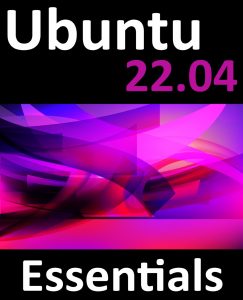Ubuntu Linux is one of a number of variants (also referred to as distributions) of the Linux operating system and is the product of a U.K. company named Canonical Ltd. The company was founded in 1994 by Mark Shuttleworth. The origins of Linux, however, go back even further. This chapter will outline the history of both the Linux operating system and Ubuntu.
What exactly is Linux?
Linux is an operating system in much the same way that Windows is an operating system (and there any similarities between Linux and Windows end). The term operating system is used to describe the software that acts as a layer between the hardware in a computer and the applications that we all run on a daily basis. When programmers write applications, they interface with the operating system to perform such tasks as writing files to the hard disk drive and displaying information on the screen. Without an operating system, every programmer would have to write code to access the hardware of the system directly. In addition, the programmer would have to be able to support every single piece of hardware ever created to be sure the application would work on every possible hardware configuration. Because the operating system handles all of this hardware complexity, application development becomes a much easier task. Linux is just one of a number of different operating systems available today.
UNIX Origins
To understand the history of Linux, we first have to go back to AT&T Bell Laboratories in the late 1960s. During this time, AT&T had discontinued involvement in developing a new operating system named Multics. However, two AT&T engineers, Ken Thompson, and Dennis Ritchie, decided to take what they had learned from the Multics project and create a new operating system named UNIX which quickly gained popularity and wide adoption both with corporations and academic institutions.
A variety of proprietary UNIX implementations eventually came to market, including those created by IBM (AIX), Hewlett-Packard (HP-UX), and Sun Microsystems (SunOS and Solaris). In addition, a UNIX-like operating system named MINIX was created by Andrew S. Tanenbaum and designed for educational use with source code access provided to universities.
Who Created Linux?
The origins of Linux can be traced back to the work and philosophies of two people. At the heart of the Linux operating system is something called the kernel. This is the core set of features necessary for the operating system to function. The kernel manages the system’s resources and handles communication between the hardware and the applications. The Linux kernel was developed by Linus Torvalds, who, taking a dislike to MS-DOS and impatient for the availability of MINIX for the new Intel 80386 microprocessor, decided to write his own UNIX-like kernel. When he had finished the first version of the kernel, he released it under an open-source license that enabled anyone to download the source code and freely use and modify it without having to pay Linus any money.
 |
You are reading a sample chapter from Ubuntu 22.04 Essentials. Buy the full book now in eBook ($24.99) format. Includes 36 chapters. Learn more. |
Around the same time, Richard Stallman at the Free Software Foundation, a strong advocate of free and open-source software, was working on an open-source operating system of his own. Rather than focusing initially on the kernel, however, Stallman began by developing open-source versions of all the UNIX tools, utilities, and compilers necessary to use and maintain an operating system. By the time he had finished developing this infrastructure, the obvious solution was to combine his work with the kernel Linus had written to create a complete operating system. This combination became known as GNU/Linux. Purists insist that Linux always be referred to as GNU/Linux (in fact, at one time, Richard Stallman refused to give press interviews to any publication which failed to refer to Linux as GNU/Linux). This is not unreasonable, given that the GNU tools developed by the Free Software Foundation make up a significant and vital part of GNU/Linux. Unfortunately, most people and publications refer to Linux as Linux, which will probably always continue to be the case.
2.4 The History of Ubuntu
As mentioned previously, Ubuntu is one of a number of Linux distributions. The source code that makes up the Ubuntu distribution originates from a highly regarded Linux distribution known as Debian, created by Ian Murdoch.
A South African internet mogul named Mark Shuttleworth (who made his fortune selling his company to VeriSign for around $500 million) decided it was time for a more user-friendly Linux. He took the Debian distribution and worked to make it a more human-friendly distribution which he called Ubuntu. He subsequently formed a company called Canonical Ltd to promote and provide support for Ubuntu.
If you are new to Linux or already use Linux and want to try a different Linux distribution, it is unlikely you will find a better option than Ubuntu.
 |
You are reading a sample chapter from Ubuntu 22.04 Essentials. Buy the full book now in eBook ($24.99) format. Includes 36 chapters. Learn more. |
What does the word “Ubuntu” Mean?
The word “Ubuntu” is an ancient Zulu and Xhosa word that means “humanity to others”. Ubuntu also means “I am what I am because of who we all are”. It was chosen because these sentiments precisely describe the spirit of the Ubuntu distribution.
Summary
The origins of the Linux operating system can be traced back to the work of Linus Torvalds and Richard Stallman in the form of the Linux kernel combined with the tools and compilers built by the GNU project.
Over the years, the open-source nature of Linux has resulted in the release of a wide range of different Linux distributions. One such distribution is Ubuntu, based on the Debian Linux distribution created by Canonical Ltd, a company founded by Mark Shuttleworth

